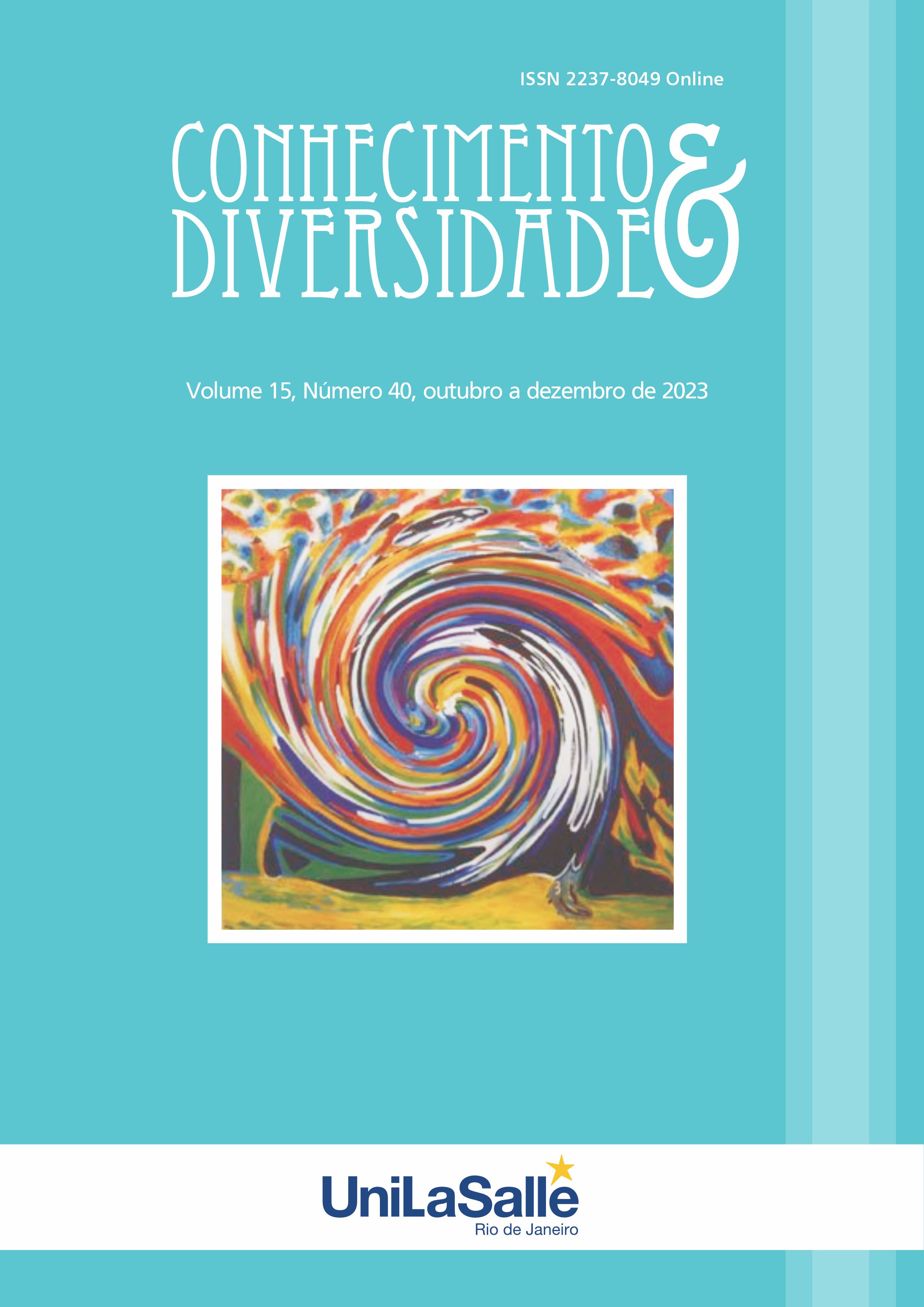ANÁLISE LINGUO-COGNITIVA DE UM TEXTO LITERÁRIO
MEIOS LINGUÍSTICOS DE EXPRESSÃO DE CONCEITOS E IMAGENS
DOI:
https://doi.org/10.18316/rcd.v15i40.11253Palavras-chave:
Texto artístico, Linguística cognitiva, Conceito, Imagem, Meios linguísticos, Análise linguístico-cognitivaResumo
O trabalho dedica-se ao estudo da análise linguo-cognitiva de um texto literário no aspecto dos meios linguísticos de expressão de conceitos e imagens. A relevância deste artigo se deve à crescente atenção dada à análise do texto literário utilizando os métodos e técnicas da linguística cognitiva. Os principais aspectos da linguística cognitiva, da análise linguística-cognitiva e do texto como objeto de pesquisa em linguística cognitiva são amplamente abordados no trabalho. São definidas as principais características do texto literário, seus componentes e a análise linguístico-cognitiva dos meios linguísticos de expressão de conceitos e imagens. O objetivo da pesquisa é revelar a análise lingocognitiva de um texto literário no aspecto dos meios linguísticos de expressão de conceitos e imagens. O objeto de pesquisa é um texto literário como material para pesquisas linguísticas e cognitivas. Métodos de pesquisa. Métodos de pesquisa como descrição, análise e síntese, comparação, generalização, análise cognitiva, análise linguística e modelagem foram utilizados no trabalho. O artigo revela a análise linguístico-cognitiva do texto literário em termos de meios linguísticos de expressão de conceitos e imagens. Caracteriza-se a essência do conceito de “linguística cognitiva” e os principais aspectos desse fenômeno. A interpretação do termo “análise linguístico-cognitiva” é definida. A essência do conceito de “texto” e as características de classificação do texto são descritas. O trabalho científico descreve as características do texto literário. São caracterizados os componentes do texto literário que influenciam a análise linguística-cognitiva. Elementos do texto literário como imagem, conceito, personagem e avaliação são resumidos.
Referências
Ahmed, S. (2021). The Language of Creativity: Validating Linguistic Analysis to Assess Creative Scientists and Artists. Front Psychol, 12, 72–82.
Alduais, A. (2022). Cognitive Linguistics: Analysis of Mapping Knowledge Domains. Intell, 10, 93–95.
Arkhipova, I. (2020). Methodology for the analysis of authorial indents in English literary prose works. Transcarpathian Philological Studies, 13, 7–12.
Betsenko, T. (2023). Analysis of the artistic text: lingvocultural approach. Opera in linguistica ukrainiana, 1, 247–253.
Bozhko, O. (2018). Linguistic representation of the atmosphere of suspense in English-language fiction works of the horror genre: a semantic-cognitive aspect. Kherson: Kherson State University, 380 p.
Chistyak, D. (2016). Research of the artistic concept in the linguopoetic perspective. Scientific bulletin of I. Franko State University, 5, 157–159,
Chrzanowska-Kluczewska, E. (2017). Language − Literature − the Arts: A Cognitive-Semiotic Interface. Krakow: Jagiellonian University, p. 326.
Csábi, S. (2018). Expressive Minds and Artistic Creations: Studies in Cognitive Poetics. Oxford: Oxford University Press, p. 97.
Freeman, M. (2009). Cognitive Linguistic Approaches to Literary Studies: State of the Art in Cognitive Poetics. The Oxford Handbook of Cognitive Linguistic, 1, 1175–1202.
Ghani, A. (2016). A Cognitive Stylistic study of poetic discourse. Al-Ustath, 2, 17–34.
Golikova, N. (2019). Artistic discourse of P. A. Zagrebelny: linguistic-cognitive and pragmatic aspects. Kyiv: Institute of the Ukrainian Language of the National Academy of Sciences of Ukraine, 530 p.
Hart, C. (2019). Cognitive Linguistic Approaches to Text and Discourse: From Poetics to Politics. Edinburgh: Edinburgh University Press, p. 206.
Honcharuk, O. (2014). Methodology of linguistic-cognitive analysis of an English-language prose fable. Scientific notes of the National University “Ostroh Academy”, 42, 47–50.
Ibáñez, F. (2010). Review of Cognitive Linguistics. Spanish Cognitive Linguistics Association, 8, 203-209.
Jurin, S. (2017). Texts and Their Usage Through Text Linguistic and Cognitive Linguistic Analysis. Rijeka: Faculty of Humanities and Social Sciences, p. 151.
Kupchyshina, Yu. (2021). Linguistic operations as a cognitive basis for the formation of the tragic in artistic prose works. Actual problems of philology and translation studies, 22, 72–75.
Movchan, M. (2015). Linguistic analysis of artistic text. Actual problems of philology and translation studies, 9, 121–125.
Petrenko, L. (2020). Concept concept and conceptual analysis of artistic text. Science and Education a New Dimension, 216, 49–52.
Petrova, O. (2016). Linguistic analysis of specific branch terminological systems. Materials of the XXVI International scientific and practical Internet conference “Problems and prospects of the development of science at the beginning of the third millennium in the countries of Europe and Asia”, 1, 298–300.
Semino, E. (2023). Cognitive stylistics: language and cognition in text analysis. Linguistic approaches to literature, 3, 23–47.
Shtyrlina, E. (2020). Artistic Concept: Approaches and Directions of its Study in Linguistics. Utopía y Praxis Latinoamericana, 25, 15–20.
Skaliky, S. (2018). Beyond Liter ond Literal Meaning: Linguistic аnd Cognitiv al Meaning: Linguistic аnd Cognitive Features оf Figurative Language Processing and Production. Atlanta: Georgia State University, p. 285.
Tairova, F. (2020). Cognitive Principles of Information Coverage in Literary Texts in English and Uzbek. International Journal of Social Science аnd Human Research, 4, 2985–2987.
Tatsakovich, U. (2018). Intertextuality in the linguistic-cognitive dimension. Scientific Bulletin of the International Humanitarian University, 35, 94–97.
Temirova, F. (2021). The Concept of Discourse Analysis in Linguistics Artistic Discourse and Discourse Analysis. IJMRA, 4, 1713–1716.
Downloads
Publicado
Edição
Seção
Licença
Copyright (c) 2023 Natalia Myronova, Alla Poltoratska, Svitlana Romanchuk, Svitlana Bernatska, Dmytro Boklakh

Este trabalho está licenciado sob uma licença Creative Commons Attribution 4.0 International License.
Conforme recomendado pelo o Public Knowledge Project, a RCD adota para seus artigos uma licença CREATIVE COMMONS: Atribuição CC BY 4.0.
Esta licença permite que outros distribuam, remixem, adaptem e construam sobre o seu trabalho, mesmo comercialmente, desde que lhe dêem crédito pela criação original.
Esta é a licença mais adequada oferecida.
Recomendado para a máxima divulgação e uso de materiais licenciados.



